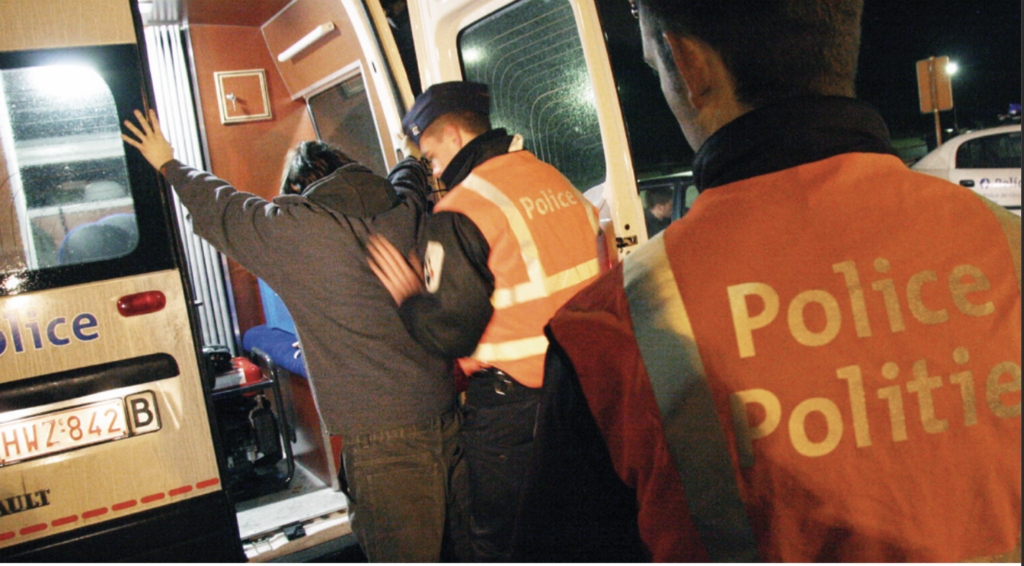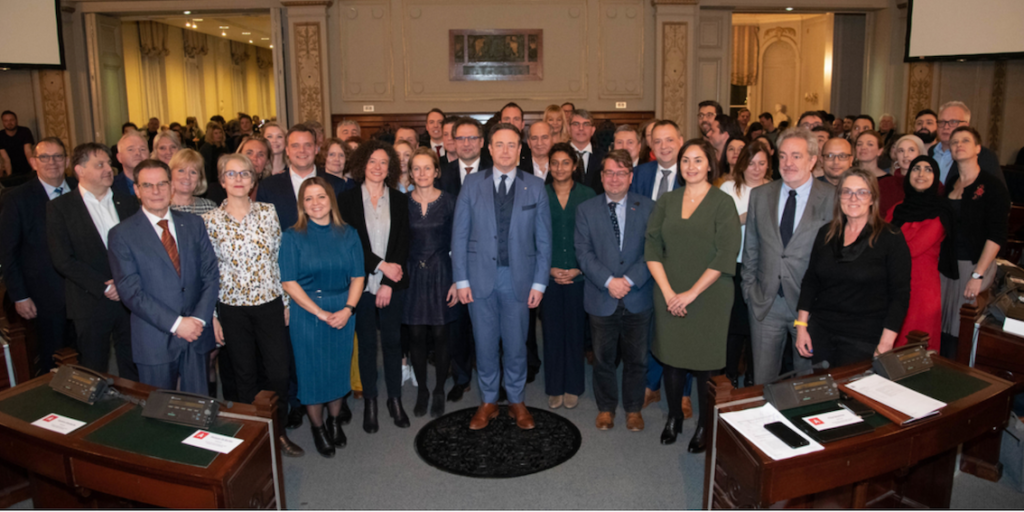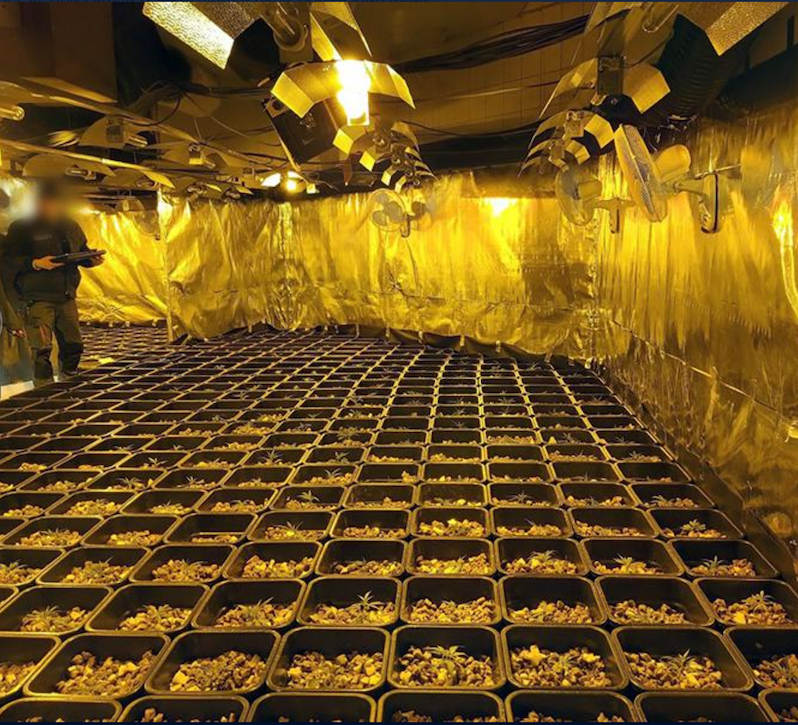The city on the brink of becoming a narco-state
With 61.8 metric tons of cocaine and 504 kilograms of marijuana seized in 2019, the Port of Antwerp has produced an increase of violence in Belgium’s second largest city. Rival, violent gangs are competing for control of smuggling operations in the area. A gang war has over- flowed into the streets of the city. Narco-fueled criminals are using methods most commonly seen in terrorist operations, such as car bombs, on city streets and residents of the city are in fear for their lives. It is estimated that about 2 billion euros have been generated through this illegal business.

the severed hand of Antigoon © Edm
Stronger law-enforcement action must be taken, not only to address the symptoms of the issue but to eradicate the root cause. Ending narco-trafficking in the port of Antwerp will drastically decrease regional violence by removing the motivation for in-fighting, as well as removing the primary source of funding for violent activities.
Moreover, this dramatic situation is eroding the local economy through the increase of violence. This unrestrained violence degrades local infrastructure and human capital which ultimately weighs heavily on the local economy. Additionally, if it continues to increase, it will threaten the operational viability of the port of Antwerp – a key regional economic hub in Europe.
This situation has been going on since several years but it seems as the lack of effective reaction from the local and national authorities has given the drug trafficking organisations an advantage that has enabled them to increase their criminal activities.

Facing a popular outcry and a strong admonition from the international law enforcement institutions, the judicial authorities and law enforcement agencies launched in 2018 the “Stroomplan” (flowplan) aimed at stemming this traffic. The initial squad of 40 officers was called Kali most probably as a reference to the famous Cali drug cartel in Colombia. It became soon obvious that this governmental initiative would quickly be countered by the drug trafficking organisations who would counter the “Stroomplan” with even more violence. “Fortunately we are still light-years away in Antwerp from being like Cali” said Antwerp mayor Bart De Wever to the Belgian television station VRT. “But the increasing cash volume of drug gangs means that they can disrupt the city and society.” As for the then minister of interior Jan Jambon: “These actions have only one aim in sight; to trap the drug gangs operating on our territory ”.

Police looking for illegal drugs © Edm
Unfortunately, mainly because of the complicated Belgian linguistic political system, the cooperation between the different Belgian judicial entities did not facilitate the tremendous task of the Kali squad. More than a year later, the Antwerp Mayor had to admit that the multi-agency approach made appear cultural disagreements and rivalry between local and federal agents to the extent that about half of the task force members resigned. In a request by the City of Anwerp study evaluating the “Stroomplan”, the Institute for International Research on Criminal Policy (IRCP) asserted that ; “The multitude of actors concerned, skills, policies and regulatory frameworks constitutes an obstacle to the implementation of an integrated and integral security policy”. It proposes to give the federal government a more important role in facilitating the exchange of information. Reacting to this study Bart De Wever asserted :“As the researchers indicate, it is not just a question of drugs and Antwerp. The next federal government will have to be persistent in tackling drug problems and the criminal activities that result from them.”

It is interesting to mention that the same Bart De Wever is a key player in the long-lasting (300 days in mid-March) Belgian negotiation saga to form a government since the last elections that have left the country with very limited power. Bart De Wever who is a member (and previous leader) of the New Flemish Alliance (N-VA), a Belgian political party advocating independence for the Flemish region of Belgium within the European Union, is the object of a political boycott from several Belgian political parties that are reluctant to form a governemental alliance with the N-VA which they regard as a right wing, radical party.

© Portofantwerp
Recently, Bart De Wever declared on Flemish television “Justice is the weakest link in the flow.” A clear joke from the Antwerp mayor (New Flemish Alliance) addressed to Justice Minister Koen Geens (Flemish Christian Democrat). The latter accusing the Interior Minister Jan Jambon (New Flemish Alliance) of not having responded to the appeal by the Ant- werp federal judicial police to recruit additional people, adding: “The deficit has only increased in recent years, even to 30 percent. The recruitments of that service fall under the Interior, and not under the Justice department.”
Meanwhile, the situation in Antwerp seems to get worse; the city is regularly shocked by drug violence. Moroccan and Albanian organized crime gangs have taken over the cocaine trafficking and distribution in the area and do not hesitate to resort to violence to strengthen their grip on the city. The federal police reported several incidents with grenade attacks and other explosives, arson, physical threats and other urban violence. “I dare say in Antwerp we are on the verge of seeing people also buying political influence” had to admit the mayor in another interview to the Flemish press.

In September 2018, seven months after the creation of the “Stroomplan”, Filip Dewinter, one of the leading members of Vlaams Belang, a right-wing Flemish nationalist and secessionist political party who is a member of the Antwerp city council and member of the Flemish Parliament, asserted in an interview with the daily, De Morgen: “ The illegal economy in different parts of the city of Antwerp, due to the drugs mafia has become bigger than the legal economy” He added: “Some neighbourhoods have become like Gotham City”.
A year later, when several drug related explosions took place in the area around the Spoor Noord Park in Antwerp, showing that the situation did not seem to improve, more members of the city council came forward to criticise the mayor. “It looks like the drug mafia is doing what it wants in our city,” said Wouter Van Besien, a leading environmentalist. As for Filip Dewinter, he requested that soldiers be able to patrol the neighbourhood and that searches be carried out on known drug traffickers. “You can’t really win the war on drugs,” said Socialist council member Jinnih Beels on Flemish television VRT “it is an effect of communicating vessels, if the drug problem is fought in one place, it reappears elsewhere”.

In the last months, due to the Belgian political “saga”, the drug fight has been put aside by the politicians who are entangled in their endless negotiations in view of forming a viable coalition to lead the country. Even the harshest critics of De Wever in the Antwerp political spectrum have shifted their attention away from that problem. To the extent that in order to form a coalition, some have become the mayor’s allies, avoiding frontal attacks.
With Belgium without a government and the fight against the coronavirus taking up most of the nation’s resources, it seems obvious that for the near future the war on drugs in Antwerp will not be high on the list of priorities.
At present, Bart De Wever, basing his judgement on the conclusion of the study by the Institute for International Research on Criminal Policy said : “it is up to the next Federal Government to demonstrate perseverance to combat the drugs problem and related criminal activities. Therefore, it would do well to follow the recommendations, provide more people and resources, and create more legal and organizational clout. ”

The only beneficiaries of this political skirmish are those illegal drug organisations that increase their traffic in the region, taking advantage of the lack of a strong judiciary counter- measure. And business goes on as usual. In confirmation, in January 2019, the Belgian police arrested 10 suspects during a cocaine bust of 413 kilos of cocaine, seized in a container coming from the Dominican Republic.
The European institutions are aware and also worried about this situation. “The port of Antwerp has emerged in recent years as a significant international drug trafficking hub, primarily for cocaine” says The European Monitoring Centre for Drugs and Drug Addiction (EMCDDA). “Current law enforcement priorities in Belgium aim to ensure public safety and order through enhanced inter agency cooperation, with a focus on consistent enforcement of criminal justice measures in the field of drugs. While particular emphasis has been placed on the port of Antwerp in recent years, the police mainly focus their activities on the large-scale production of illicit substances”

According to the EMCDDA, in 2015, total public expenditure related to illicit substance use was estimated at almost EUR 470 million, amounting to 0.1 % of Belgium’s GDP (0.5 % in the UK).
The port of Antwerp which covers the largest port area in the world is an ideal terrain for drug – related illicit activities. Each day 150,000 people enter and leave the port. With a surface area of 12,068 hectares, or about 24,000 football fields, 710 quay numbers, 91 port numbers and 900 companies, the port is a veritable, large city. In 2019, more than 41,000 kilograms of cocaine were seized on cargo ships in the port of Antwerp, with a street value of more than two billion euros. Most of the merchandise originated from South America.
James Lookwood

Click here to read the 2020 April edition of Europe Diplomatic Magazine


